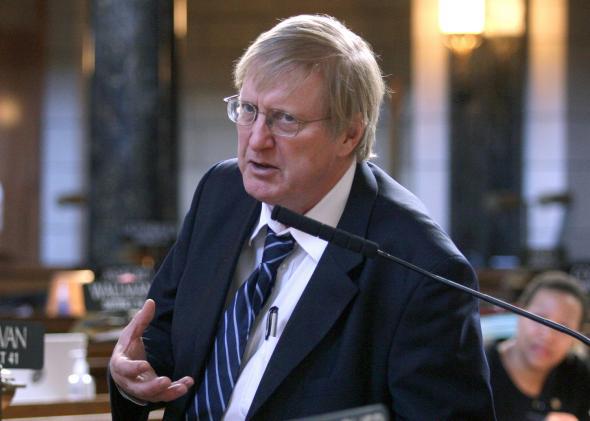Last Tuesday, as the Nebraska legislature considered a bill making it easier for military spouses to carry concealed handguns, an unlikely issue arose: gay marriage. As written, the bill covered only spouses of military members whose marriages were recognized under state law—that is, opposite-sex partners. But Republican Sen. Paul Schumacher challenged that language, proposing an amendment that would define “spouse,” for the purposes of the legislation, using federal law—that is, including same-sex partners.
“Is not the Second Amendment sex-blind? Color-blind?” Schumacher asked during the debate. “What great evil would come from saying a partner of somebody in the military … is entitled to exercise their Second Amendment rights to carry a concealed weapon in this state?”
Schumacher’s amendment was adopted by a vote of 38-0. I spoke with him on Friday about his support of gun rights for gay couples.
What inspired you to propose this amendment?
The Second Amendment belongs to everybody. The Second Amendment is the escape clause in the Constitution. The Founding Fathers put in the First Amendment dealing with press, freedom of association. The nuts and bolts of our political process. But in the next breath, they had to wonder, just having come out of a period of repression and need for revolution—what if, despite the best efforts, that system of democracy and the Constitution did not function well? In the end, their mentality [was that] an armed population is very difficult to enslave.
For all the arguments that can be made against the right of the people to keep and bear arms, the countervailing argument is unbelievably strong in an age when our communications are monitored by the government, when government can put drones in the air above us. People need to maintain a level of liberty.
Why were you unsatisfied with the original bill?
The original bill talked in terms of extending a concealed carry provision to the spouses of folks in the military. And the question arose during debate of whether or not that was intended to cover the people who were considered to be spouses under federal law on those bases. And the sponsor of the legislation said that was not his intent. And then the debate got off on—is there any reason why people who are receiving the benefits of a spouse of someone on the base should not have the benefits of this law?
One reason might be because the Nebraska state constitution forbids the recognition of same-sex marriage.
The amendment doesn’t [recognize gay military members’ spouses as their legal spouses], because our constitution prohibits saying that they are spouses. But we can create exceptions in which we say: Someone who receives a benefit of a spouse of a military person under federal law will [be covered] by this legislation. And that’s what everyone was satisfied was a good and fair thing to do.
Basically, the amendment grants benefits using [the federal government’s definition] of who gets benefits. If the federal government came out with a ruling that we confer upon a general’s grandmother the same rights and benefits of a general’s spouse—this would cover a pistol-packing grandma.
Do you support same-sex marriage?
The people in my district do not support it.
Do they support including same-sex spouses in this new gun bill?
As a general rule, they like the Second Amendment.
Presumably, though, your constituents oppose the court ruling that permitted the Pentagon to grant benefits to same-sex military spouses. Why should they then support a state law that can be traced back to that ruling?
They haven’t had a role in the procedure of how the military or the executive branch at the federal level awards benefits to spouses.
Have you faced significant pushback from your support of the bill?
No.
Any idea why?
The state likes the Second Amendment. There’s no reason to say the Second Amendment doesn’t belong to everybody.
This interview has been lightly edited and condensed.
